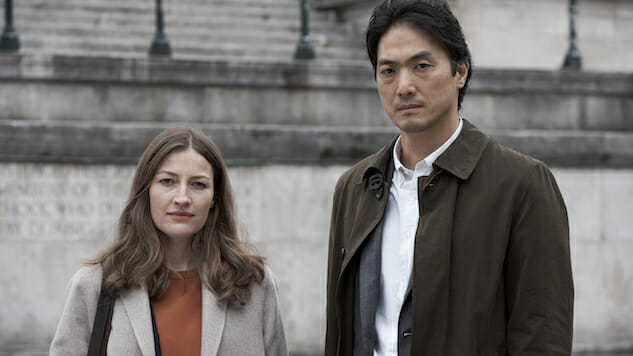With Giri / Haji, Netflix Delivers a Masterful, Emotionally Engrossing International Thriller
Don’t let the subtitles scare you off.
Photo Courtesy of Netflix
BBC Two’s Giri / Haji, available in the U.S. via Netflix, is already one of the year’s best surprises. The international thriller starts when a Tokyo detective, Kenzo Mori (Takehiro Hira), is tasked by a prominent Yakuza crime family—in conjunction with the police force—to secretly go to London in search of his brother Yuto (Yosuke Kubozuka ), who he thought died a year ago. The hope is that bringing Yuto back will stop a sprawling war that he helped kickstart among the Yakuza factions. But like Kenzo’s investigation into Yuto’s disappearance and faked death, Giri / Haji is full of unexpected twists, not just in its narrative but in its form. It’s dark and violent at times, but also funny and full of heart. At the center of the story is the tale of two brothers, yet it’s also about forged family and discovering the truth about one’s self. The gang war is the framework for the story, which plays out in many ways like Lock, Stock, and Two Smoking Barrels (as far as a variety of different crime bosses all marching towards one another); and yet, one of its most moving scenes takes place during a quiet, makeshift Yom Kippur dinner regarding atonement.
Giri / Haji translates into Duty / Shame, which sums up almost every struggle its characters face. Yuto is in trouble with the Fukuhara family, but Kenzo also has complicated feelings towards his younger, wayward brother and his recent Yakuza connection—and not just because Kenzo helped him cover up a murder. This is just one of a myriad of complicated dynamics and secrets revealed throughout the series’ eight unique and masterful episodes, which intriguingly come to a natural conclusion in the fourth hour and then continue in a kind of extended coda that includes a black and white interpretive dance sequence, mirroring the deep emotions and entanglements of its characters, that will absolutely make you weep.
If all of this sounds horribly pretentious I promise you it’s not, it’s just frankly stunning. And, crucially, funny. This blended show is grounded by its very real characters put into very unreal situations, best embodied by a London teacher, Sarah (Kelly Macdonald), who gets accidentally embroiled in this international web of deceit and death. “Who is this?” she asks Kenzo in his student housing dorm room (his undercover persona is a detective in an exchange program taking Sarah’s class). “He’s a male prostitute who helped me with a task and then got injured, so I’m letting him stay here,” Kenzo replies nonchalantly, talking about the young druggie Rodney, who is writhing half-naked on his bed. “At any point when those words were coming out of your mouth did you think they sounded like a satisfactory explanation?” Sarah asks in disbelief, but also with a smile.
The British characters are also the comic relief in the series, from Sarah’s astonished Scotswoman to an eloquent crime boss (Charlie Creed-Miles) and most especially the haunted, glib, half-Japanese rent boy Rodney (Will Sharpe, in a standout role). Kenzo’s difficult journey to London is also lightened, and complicated, by the arrival of his teenage daughter Taki (Aoi Okuyama), who was recently expelled from school for stabbing a boy in the leg. She said he was trying to grope her, no one is really sure, but it’s clear that both Kenzo and Taki needed to escape home and be thrown into something new.